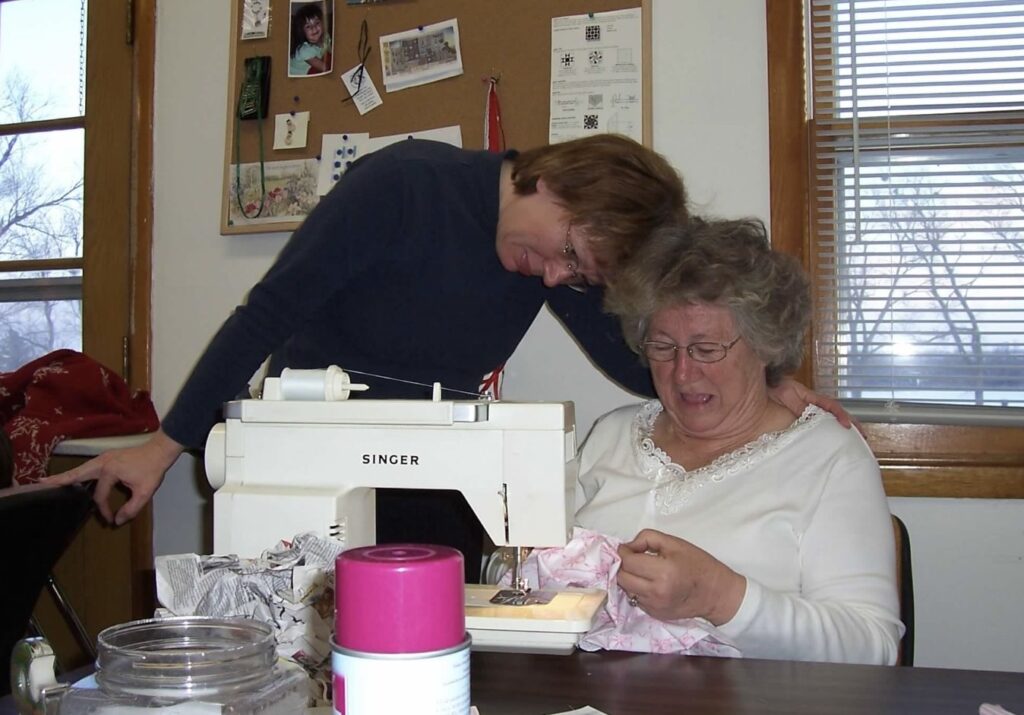Bette Boellstorff, a passionate sewing enthusiast from Nebraska, accumulated an impressive collection of over 300 sewing machines over 40 years, demonstrating her deep appreciation for both the craft and its history. Bette’s journey into the world of sewing machines began with farm sales, tips from acquaintances, and generous donations from friends who recognized her love for the craft. Her extensive collection includes various machines, ranging from the historic Singer Standard 1, the company’s inaugural machine from 1850, to the coveted portable Featherweights favored by quilters. Her machines showcase a plethora of vibrant colors and designs, including classic toy models, bulky industrial machines, and stunning examples like the Singer 66 Red-Eye, known for its decorative decals. Each machine represented more than just a tool; they embodied stories and histories of women’s lives as they transformed fabric into meaningful creations.
Bette’s daughter, Carrie Knapp, shared insights into her mother’s ability to connect with each machine on a personal level, recognizing the significant role they played in empowering women throughout history. Bette meticulously documented the history of her machines, maintaining an index card for each that included details about its origin, previous owners, and the lives it had touched. Bette was passionately invested in preserving the legacy of sewing as a medium of woman’s productivity, seeing every interaction with fabric and thread as part of a broader narrative that shaped their lives and communities. Her profound respect for the functionality of these machines showcased her belief in sewing as not merely a hobby, but a vital skill that bridges generations.
After Bette’s passing in 2012, her family decided to seek new homes for her extensive collection, which filled their family home near their Nebraska farm. In response, an auction was organized, scheduled for November 1 and 2 in Syracuse, Nebraska, to give others the opportunity to appreciate and own a piece of Bette’s cherished collection. The auction features not only the sewing machines but also a significant fabric stash collected by Bette through the years, some of which dates back to the 1920s. As word of the auction spread, it caught the attention of sewing enthusiasts and collectors across the country, generating significant interest, with auctioneer Liz Hunt describing it as the “auction of a lifetime.” The anticipation surrounding the event grew, with reports of prospective bidders traveling from as far away as Colorado, Texas, and even London to participate.
Among the anticipated highlights of the auction are the popular Singer Featherweight machines, known for their value among quilters. Expert Judy Fletcher emphasized the importance of condition in determining the worth of the machines, with some rarer models potentially fetching thousands of dollars. The diversity and historical significance within Bette’s collection, combined with the passionate demographic of collectors and quilters, promises to create an exciting atmosphere at the auction. Each sewing machine holds its mystique, with certain models like the first Featherweights and “crinkle” designs particularly coveted, showcasing the variety in desirability among collectors. This auction serves not only as an opportunity to acquire remarkable sewing machines but also as a tribute to Bette’s legacy and dedication to the craft.
Bette’s upbringing undoubtedly influenced her love for sewing; she excelled in the skill despite facing financial challenges in her youth. The regional Betty Crocker award she won during high school highlighted her talent in homemaking and reinforced her ability to create something beautiful from limited resources. Bette crafted her own wedding dress and made clothing for her four children and local friends, illustrating her commitment to sewing as a form of self-expression and community support. Her role as a skilled seamstress extended into her professional life as well, including work in a wedding dress store where she altered dresses for brides, further showcasing her versatility and dedication to helping others through sewing. Bette’s passion became a familial legacy, eventually leading to the collection that would surpass societal norms regarding women’s crafts.
The origin of Bette’s collection can be traced back to the early 1980s when she and her husband, Dan, began frequenting farm sales, a hobby that soon turned into a thrilling treasure hunt for sewing machines. Bette not only loved acquiring the machines but also took joy in experimenting with them, ensuring she used each one at least once. Her expertise and enthusiasm caught the attention of her husband, who often facilitated the purchase of machines when Bette was not present. He became an integral part of her collecting adventure, even bringing home batches of machines from closed down shop sales. Dan’s remembrance of their joint endeavors captures the essence of their shared enjoyment and the familial bond it fostered through sewing.
As the auction approaches, Dan and Carrie express hope that Bette’s treasured machines will find new homes where they can continue to inspire creativity and connection. They wish for her machines to be respected, cherished, and utilized, maintaining the very spirit that Bette embodied throughout her life. While the decision to auction off the collection weighed heavily on them, the intention behind it reflects Bette’s legacy of sewing—one defined by passion, creativity, and community support. Through the auction, they aim to celebrate her life and talent, ensuring her vast collection lives on through those who truly appreciate the role of sewing in shaping lives and histories. This collective effort to preserve Bette’s cherished collection not only honors her memory but facilitates a continuation of the stories and successes woven into each fabric, stitch, and thread.

